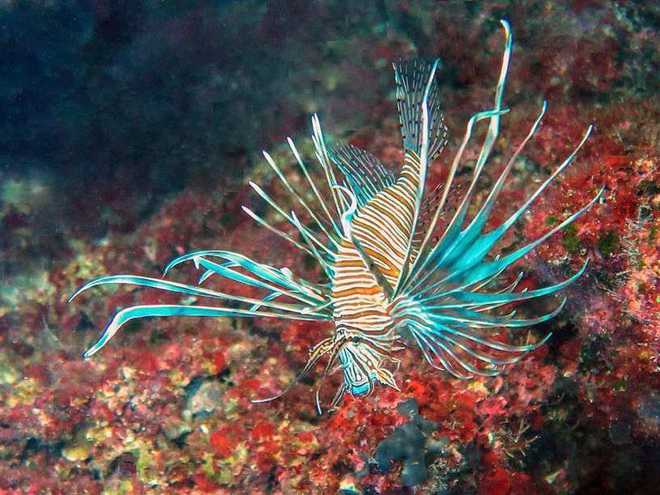
The fish, which has colonised a part of the Cyprus coast, is raising fears of devastation of native marine life
Ian Johnston
Lionfish — beautiful, venomous and voracious predators that can spawn every four days — have invaded the Mediterranean as the sea temperature rises, raising fears of environmental devastation of native marine life.
In a report published in the journal Marine Biodiversity Records, researchers said evidence from divers and fishermen had revealed that the fish had colonised part of the Cyprus coast in just a year after apparently swimming through the Suez Canal. It confirmed earlier sightings that suggested the fish might be becoming established.
There are now fears that the lionfish, which originate from the Indian and Pacific oceans but have spread to the western Atlantic and have been found off the coasts of Florida and South Carolina, could now move into the eastern Atlantic.
Its sting is extremely painful and can cause paralysis, cardiac arrest and, occasionally, death.
Researcher Demetris Kletou of the Environmental Research Lab in Limassol, Cyprus, said: “Until now, few sightings of the alien lionfish … have been reported in the Mediterranean, and it was questionable whether the species could invade this region like it has in the western Atlantic.
“But we’ve found that the lionfish have recently increased in abundance, and within a year have colonised almost the entire south eastern coast of Cyprus, assisted by sea surface warming.”
Lionfish, which can grow up to 40-cm-long, have venomous spines that deter predators and feed on a variety of fish and crustaceans.
They spawn every four days, all-year round, and produce some two million eggs a year. That swift rate of reproduction and their fast growth into adulthood means they are highly effective at colonising new reefs at the expense of native species.
Professor Jason Hall Spencer of Plymouth University, who was involved in the research, said: “Groups of lionfish exhibiting mating behaviour have been noted for the first time in the Mediterranean.
“By publishing this information, we can help stakeholders plan mitigating action, such as offering incentives for divers and fishermen to run lionfish removal programmes, which have worked well at shallow depths in the Caribbean, and restoring populations of potential predators, such as the dusky grouper.
“Given that the Suez Canal has recently been widened and deepened, measures will need to be put in place to help prevent further invasion.”
According to the US National Oceanic and Atmospheric Administration, lionfish are “one of the top predators in many coral reef environments of the Atlantic”.
“Lionfish consume more than 50 species of fish, including some economically and ecologically important species,” it says.
“Lionfish are active hunters that ambush their prey by using their outstretched, fan-like pectoral fins to slowly pursue and ‘corner’ them.” It says the sting of a lionfish “can last for days and cause extreme pain, sweating, respiratory distress and even paralysis”.
According to Lionfish.co, a website set up to co-ordinate efforts to eradicate lionfish from the Caribbean and US coast, the sting can cause cardiac arrest, and potentially fatal anaphylactic shock.
“There has been, at least, one case of paralysis in both arms and legs of a home aquarist, who was stung in the finger. The paralysis went away completely in a short time, but it was a good thing he had sought medical treatment when the symptoms of venom began to grow worse,” it says.
“Lionfish venom can cause tissue necrosis (tissue death) that has the ability to spread if not treated immediately when identified.”
A dive instructor summed up for National Geographic what it was like to be stung. “It won’t kill you, but it’ll make you wish you were dead,” he said.
— The Independent



























